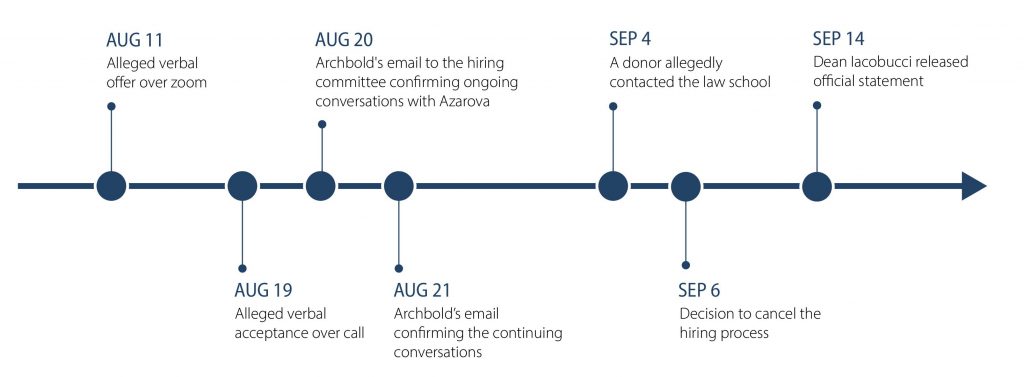This article was originally published in print on October 1, 2020. This is a developing story – for updates, refer to the comprehensive resource page here.
Controversy and conflicting stories shroud the alleged offer extended to Valentina Azarova
The month of September has been characterized by many things: masks, Zoom, and park hangouts, but perhaps most significantly by the school being embroidered in controversy over the alleged offer extended to Valentina Azarova.
According to articles in the Globe and Mail and Toronto Star, a judge sitting on the Tax Court of Canada, and donor (named by a Globe and Mail article as Justice David Spiro) to the Faculty of Law allegedly influenced Dean Edward Iacobucci’s hiring decision for the law school’s International Human Rights Program (IHRP). These allegations point to Valentina Azarova’s offer to serve as the IHRP’s Director being revoked by the Faculty due to the donor’s concern with her scholarship on the Israeli-Palestenian conflict. The Tax Court has declined media requests for comments.

Calls for independent investigation and widespread criticism
The U of T Law student body has largely been disappointed and frustrated by these allegations with many, particularly those involved with the IHRP, concerned about its fate. The IHRP offers extremely high quality legal services that serve society’s most vulnerable people. Not only is it a fantastic program for students to learn and practice international law, but it is a beacon of U of T Law’s commitment to justice,” says Jean-Pierre D’Angelo (2L), an IHRP 2020 Summer Fellow and a current executive of the IHRP’s Venezuela Accountability Project. “The alleged interference by the administration on Ms. Azarova’s candidacy not only undermines the IHRP’s ability to serve its clients, but undermines U of T Law’s reputation as a defender of procedural fairness, justice, and academic freedom. I hope that this matter is investigated and resolved expediently so that our community and the legal profession as a whole can continue to hold us in high regard.
An open letter from IHRP students and alumni “demand a clear, actionable plan for rehabilitating the IHRP’s and the Faculty’s reputation and for ensuring the IHRP’s success and integrity for future generations of law students.” The Students’ Law Society has penned a letter calling for greater accountability of the administration.
The Canadian Association of University Teachers (CAUT) announced on September 21 that it is investigating the allegations of external interference, which if true, would “constitute a serious breach of widely recognized principles of academic freedom.”
This controversy has prompted Leslie Green and Craig Scott, law professors at Queen’s University and Osgoode Hall Law School respectively, to both write letters to the Canadian Judicial Council urging for an investigation into the judge for inappropriately participating in controversial political discussions. At this time, the Judicial Council has not announced the commencement of an investigation.
Concern has also been voiced by Amnesty International Canada, which offers IHRP students volunteering opportunities through the Digital Verification Corps. In a letter to Dean Iacobucci on September 21, the organization stressed fear “that any appearance of impropriety could harm the future of Amnesty’s partnership with the IHRP.” Other critics include the CAUT, previous and current members of the IHRP, many members of the student body, and legal professionals, activists and academics in the broader community.
So what happens now? The fate of the IHRP
Dean Iacobucci announced that the search for an IHRP director was cancelled in the interim. But, he promised to “take advantage of this pause to make the International Human Rights Program even more successful than it has been in the past.”
However, the IHRP has been without a director for over a year. The Director hiring controversy has rekindled discussions about the school’s commitment to the IHRP. Members of the IHRP Alumni Network Steering Committee in a letter to the Dean’s Office on September 23 called the controversy “symptomatic of a longer-term failure by the Faculty of Law administration to adequately recognize and support the Program.”
The IHRP’s operating budget was already expected to suffer a 36% cut in the 2020-2021 academic year as part of the school’s austerity measures announced in 2019. Based on the calculations of the Alumni Network Steering Committee, this amounted to a 51% budget cut in real terms compared to 15 years ago, in stark contrast to a 130% tuition increase in the same period.
IHRP students and alumni emphasized the IHRP’s importance for educating and developing students in their open letter.
Tensions arising from accusations about Palestinian oppression and Anti-semitic stereotypes
Some legal professionals, activists, and academics stressed the importance of upholding academic freedom, especially in the context of contentious debates about Palestinian oppression and dispossession. Various professors interviewed by the Toronto Star believe that Azarova’s views on Israeli’s occupation are mainstream. An Al Jazeera article called the alleged recission of Azarova’s offer for her scholarship “anti-Palestinian racism.”
Additionally, Over 1,200 scholars and lawyers also signed a statement denouncing “Palestenian speech suppression.”
Given the discourse surrounding this developing news story, U of T Law’s Jewish Law Students Association (JLSA) cautioned the law school community in an open letter against perpetuating anti-Semitic stereotypes. The letter explained, “perhaps one of the most insidious of such stereotypes is the long-held belief that Jews act as ‘puppet masters,’ controlling and exerting influence behind the scenes while never the focus of attention.” The JLSA expressed its disappointment that an inference of the judge being Jewish was made so quickly despite no mention of the judge being Jewish in the initial Globe and Mail article.
While the events surrounding this story are doubtful, and students and the broader community may not know what truly happened, one thing’s for sure: the administration must commit to fair and transparent procedures free from external influence.
Members of the Ultra Vires editorial board have been and continue to be involved with the IHRP and are signatories to the IHRP Students and Alumni Open Letter.





